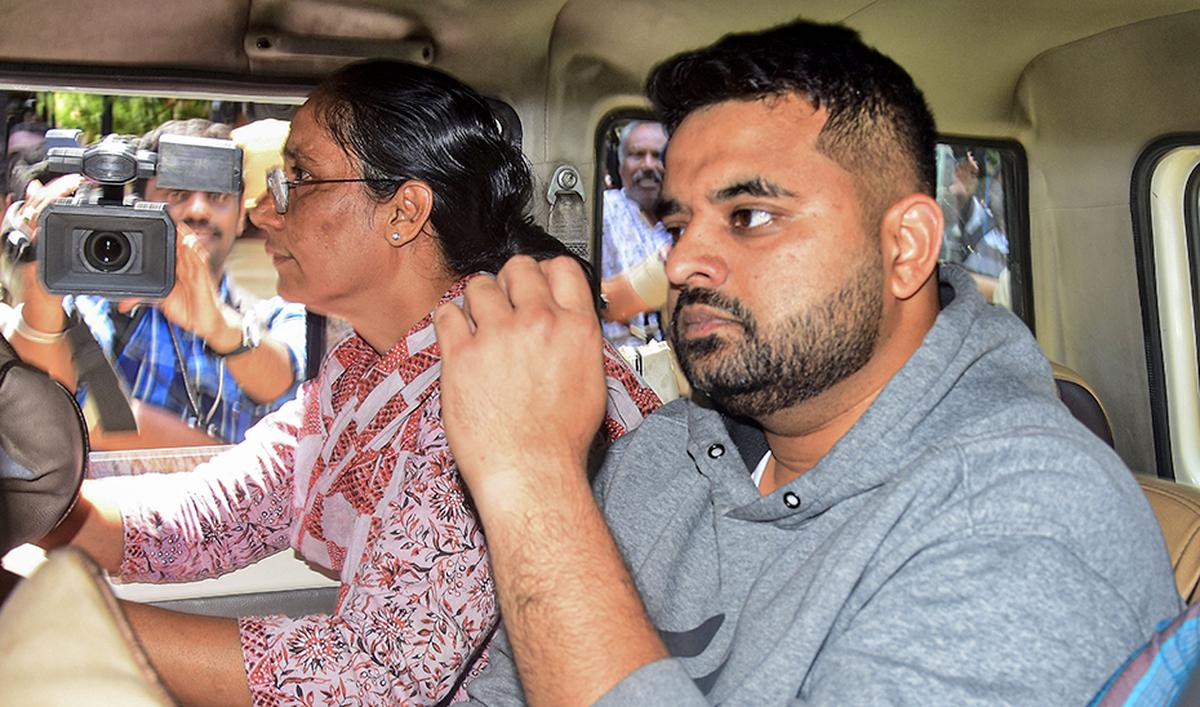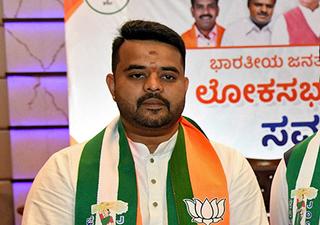Former Hassan MP Prajwal Revanna, grandson of JDS patriarch and ex-Prime Minister H.D. Deve Gowda, was convicted on August 1, 2025, by a special court in Bengaluru in a sensational rape case. The conviction comes 14 months after the case was registered, following an unusually swift and closely watched trial. Revanna, whose political lineage made the scandal especially prominent, was found guilty in the first of four separate cases filed against him for sexual abuse and rape. The verdict has been hailed as a major moment for Karnataka’s criminal justice system, showing that even the most influential can be held accountable.
The charge was based on a complaint from a 47-year-old domestic worker who alleged that she was repeatedly raped by Revanna at his farmhouse in Holenarasipura, Hassan. The accused secretly recorded the abuse and, according to investigations, attempted to use these recordings to intimidate the survivor. The case erupted into a national scandal in April 2024, after explicit video clips surfaced on social media, and pen drives containing videos were recovered in Hassan. When the scandal broke, Revanna fled India—reportedly to Germany—but was apprehended upon his return following the loss of his parliamentary seat.
The trial, presided over by Judge Santhosh Gajanan Bhat of the Special Court for MPs/MLAs, was notable for its speed and rigor. The prosecution’s case rested on extensive digital and forensic evidence, including the survivor’s preserved clothing, which matched DNA samples, and corroborative witness statements. The 1,632-page chargesheet filed by the Special Investigation Team was bolstered by over 100 witnesses and extensive digital evidence, making the case particularly strong. The survivor herself had to be rescued by the SIT, as she was allegedly abducted by the accused’s family to prevent her from testifying but later provided key testimony under police protection.
Public reaction in Karnataka and across India has been intense, both for the gravity of the crime and the unprecedented speed of justice delivered against a high-profile political figure. Women’s rights activists and legal experts have hailed the conviction as a clear message that no one is above the law, regardless of status or influence. The verdict also brings attention to the many survivors who have not yet spoken out, and the hope that this conviction empowers other victims to seek justice. Revanna, upon hearing the verdict, broke down in court and will remain in Bengaluru Central Prison as he awaits sentencing and prepares for appeals.
This is the first of four major cases against Prajwal Revanna—each involving allegations from different women, supported by digital evidence and accusations of blackmail and intimidation. The sentencing in this case could see Revanna face a minimum of 10 years in prison, possibly extending to life imprisonment, subject to the court’s final decision. His legal team is preparing to appeal, but the conviction is already seen as a landmark in the fight against politically empowered sexual abuse in India.

Swift Trial, Powerful Evidence, and Historic Precedent
The case against Prajwal Revanna gained momentum after videos began circulating online, prompting public outrage and a flurry of FIRs. The Special Investigation Team acted decisively, gathering significant digital, forensic, and testimonial evidence to build a watertight case—a fact acknowledged by both the prosecution and legal commentators. The trial, which started on December 31, 2024, saw the examination of 23 key witnesses and meticulous scrutiny of digital files and DNA evidence. The survivor’s sari, preserved and presented to the court, was a linchpin in establishing the crime through forensic analysis.
One dramatic aspect of the proceedings was the alleged abduction of the primary witness and victim. She was reportedly kidnapped at the behest of Prajwal’s politically powerful family, only to be rescued by the SIT and subsequently placed under police protection. This episode underscored both the lengths to which the accused’s family reportedly went to suppress evidence and the resolve of investigators and the judiciary to ensure justice prevailed. The court also weighed evidence drawn from Google Maps and mobile records, reflecting the trial’s thoroughness.
Throughout, the defense attempted to cast the videos as morphed and the charges as politically motivated, but the convergence of physical, digital, and testimonial evidence overwhelmed these arguments. The speed and transparency of the trial have been widely hailed by legal experts, activists, and common citizens alike, affirming that even the most politically shielded can be brought to justice.
Women’s rights advocates see this conviction as an encouraging example for others fearing retribution or intimidation. Several noted that such high-profile verdicts serve as a deterrent and offer hope for a system often seen as slow or susceptible to influence. The court’s handling of witness protection and evidence management is expected to serve as a model for future high-profile cases.
Broader Political Fallout and Ongoing Legal Battles
The conviction has sent shockwaves through Karnataka’s political landscape. Revanna’s close ties to H.D. Deve Gowda and the JDS, as well as his family’s own legal entanglements—including kidnapping charges against his father, H.D. Revanna—have fueled intense scrutiny and public debate about the role of political power in shielding accused individuals. Party members have offered little public defense since the conviction, focusing instead on damage control and the potential electoral impact.
Police officials have confirmed that Prajwal Revanna faces three other serious rape and sexual abuse cases, including allegations from several women featured in the circulating videos. Each case is being pursued individually, with strong digital evidence at the center. The historic nature of this first conviction is expected to embolden the prosecution in upcoming trials. Legal experts point out that, with each additional guilty verdict, cumulative sentences could mean decades of imprisonment.
Revanna’s conviction is already influencing public attitudes toward sexual violence cases involving powerful individuals. The rapid resolution and transparency in this trial have challenged long-standing perceptions of political impunity in India. Public pressure and sustained media attention will likely ensure close oversight of the upcoming trials as well.

Beyond the individuals directly involved, this case has also placed law enforcement and the judiciary in the spotlight. The SIT’s ability to shield the survivor and apprehend Revanna quickly despite his escape abroad was widely praised, reflecting improvements in special crime investigation in India’s justice system.
Overall, the Revanna case marks a critical turning point amid rising demands for gender justice and accountability—both in Karnataka and nationally.
Legal and Societal Implications for the Future
The successful prosecution of Revanna demonstrates how a combination of strong forensic, digital, and testimonial evidence can overcome even entrenched power structures. The trial’s expedited pace also sets a benchmark for how future cases involving public figures may be prosecuted. With robust investigation and legal safeguards for witnesses, the precedent signals to survivors, law enforcement, and politicians alike that justice can be both swift and fair.
For the survivor and her family, as well as other women allegedly victimized by Revanna, the conviction brings some measure of closure and validation. Women’s rights organizations stress the ongoing need for comprehensive victim support, including protection, compensation, and medical aid. They also highlight gaps in the justice system—particularly the difficulty survivors face in coming forward and the retaliation they encounter from powerful parties.
The verdict has sparked hope among civil society advocates for broader legal reforms—especially in fast-tracking sexual assault cases, strengthening witness protection, and curbing the political shielding of accused persons. Social media campaigns and public protests have amplified these demands, reinforcing the idea that justice must be accessible regardless of power or influence.
This case also brings home the importance of digital evidence in prosecuting sexual assault—ranging from smartphone videos to GPS and communication logs. The clarity and credibility of such evidence are increasingly pivotal in overcoming the “he said, she said” impasse that often hinders justice in abuse cases.
As sentencing looms and further trials continue, Karnataka and all of India will closely watch the ongoing repercussions of this landmark conviction.
Conclusion
Prajwal Revanna’s conviction in a high-profile rape case stands as a powerful affirmation that accountability is possible, even for political elites. The trial’s rapid pace, use of compelling forensic and digital evidence, and thorough witness protection measures exemplify a judicious, modern approach to justice in India. For the survivor and other alleged victims, this verdict offers vindication and hope, while for society at large, it signals an emerging era of zero tolerance for sexual abuse, especially by those in power.
The impact of this case is expected to resonate in future trials—both those involving Revanna and beyond—spurring legal reforms and empowering more survivors to seek justice without fear. Karnataka’s legal system, through its handling of this sensitive and complex case, has set a precedent for efficiency and fairness, marking a crucial step forward for India’s quest for gender justice and equality.
As sentencing approaches and further trials proceed, the legacy of this conviction will continue to influence the judiciary, law enforcement, and society’s expectations of justice for victims of sexual violence

The Prajwal Revanna conviction has also ignited far-reaching discussions about the significance of political reform, ethical leadership, and the vital role the public plays in demanding accountability. Across Karnataka, civic groups and youth organizations are leveraging the momentum from the verdict to campaign for greater transparency not just in criminal investigations but in political appointments and party structures.
The case has prompted introspection among elected representatives and party elders, with some advocating for new protocols to vet candidates for public office and enforce stricter codes of conduct. Simultaneously, the legacy of trauma and resilience displayed by the survivors is shaping a new public consciousness—one that insists on integrity, due process, and empathy in government and society alike. As national parties and media observers reflect on the consequences of shielding accused politicians, the Revanna case may prove to be a defining chapter in the ongoing evolution of India’s democracy, inspiring sustained pressure for justice-driven systemic change.
Follow: Karnataka Government
Also read: Home | Channel 6 Network – Latest News, Breaking Updates: Politics, Business, Tech & More

